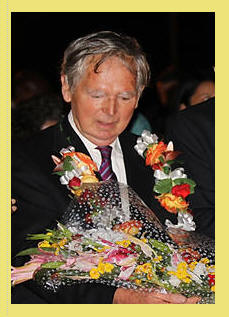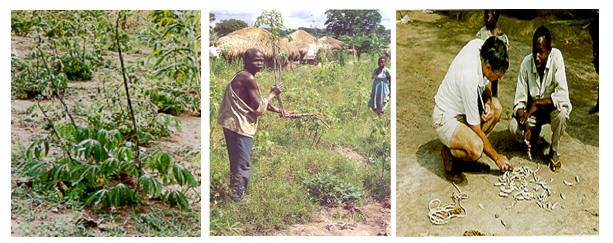Obituary:
John Michael Thresh – on
lifelong war with plant viruses.
 John Michael Thresh, aged 84 years old, died on Thursday
12 February 2015 at the Pembury Hospital Tunbridge Wells in the UK
following his battle with cancer. He leaves his wife, Peggy, four
sons, four grandsons and four grand-daughters.
Known as Mike Thresh to family and peers, the
career of Professor Thresh spanned more than 60 years.
John Michael Thresh, aged 84 years old, died on Thursday
12 February 2015 at the Pembury Hospital Tunbridge Wells in the UK
following his battle with cancer. He leaves his wife, Peggy, four
sons, four grandsons and four grand-daughters.
Known as Mike Thresh to family and peers, the
career of Professor Thresh spanned more than 60 years.
Mike came from a farming background in the north of England and
spent much of his childhood on the family farm during World War II
(1939–1945). This was before the days of full mechanisations and
he can claim to have
ploughed with horses and harvested cereals for threshing by steam
power. His mother
harboured ideas of having a "blood and guts" veterinarian in the family
but a career in agricultural research was always the preferred
option!
Mike
took a first degree in botany at Imperial College, University of
London, in 1952, in the days of Professors W. Brown and F. G.
Gregory. In the university vacations, he worked as a student at
the East Malling Research Station and walked in the Yorkshire
Dales. He spent a year with plant virologists in the Plant
Pathology Department at Rothamsted Experimental Station as a
Colonial Research Scholar. During this period there was an
opportunity for fieldwork in East Anglia on the control of sugar
beet yellowing viruses, using one of the first organophosphate
insecticides to be made available for use in agriculture.
His
first assignment overseas was in Ghana and Nigeria (1953–1960) on
the epidemiology and control of cocoa swollen shoot disease as one
of the team of virologists at the West African Cocoa Research
Institute. After seven years in West Africa, he returned to
England, bringing with him a wife and baby, and followed a similar
career focussing on virus diseases of hop, blackcurrant, and other
fruit crop species at East Malling Research Station. These studies
and contributions on
general epidemiological concepts led to a University of London
PhD and DSc, as well as a Queen's Award for Technological
Achievement to East Malling and the Department of Hop Research,
Wye College. This was for the development and deployment of
virus-free clones of improved hop varieties.
While Mike was a
staff member at EastWhile Mike was a
staff member at East Malling, a 3-month assignment to Ethiopia in
1971 for FAO was followed by other consultancies and advisory
visits on behalf of FAO, the British Council, Overseas Development
Administration (ODA), and several international agricultural
research centres. These led to a renewed acquaintance on cocoa
swollen shoot disease and the Cocoa Research Institute of Ghana
through a project funded by ODA, and then to a UK-based
appointment as plant virologist with the ODA Corps of Specialists.
East Malling continued to be the base for many overseas forays
into Africa and Asia until plant pathology was included in the
remit of the Natural Resources Institute (NRI) and the transfer
was then made to Chatham Maritime and the University of Greenwich.
Quasi-retirement and an honorary position as Professorial Research
Fellow at the University of Greenwich came in
1998
after a 5-year contract as senior virologist at NRI.
Mike
was an active member of several scientific societies: he served on
committees and councils of the Society for General Microbiology,
the Biological Council, the Association of Applied Biologists
(AAB), the Federation of British Plant Pathologists, the British
Society for Plant Pathology (BSPP), and the International Society
for Plant Pathology (ISPP). He edited/co-edited eleven
books/conference proceedings and was Programme Secretary of the
AAB (1973–1980), President of BSPP (1990), and Chairman of the
International Committee on Plant Virus Epidemiology (ICPVE) of
ISPP from its inception in 1979 until 1999. Mike was elected as
Honorary Member of BSPP in 2005, and in 2012 became the second
recipient of the Golden Cassava Award of the Global Cassava
Partnership (GCP) for the 21st Century.
Mike's overseas experience spanned more than 40 countries, but he
was especially knowledgeable on the virus problems of crops in
Africa, where his experience was second to none. He published more
than 200 papers, reviews, and book chapters. Many relate to his
own research on the epidemiology and control of viruses of
specific crops. These include cacao, hop, temperate fruits,
cassava, and a wide range of other tropical crops. Mike had a
special love for cassava and he was undoubtedly the best
epidemiologist for cassava viruses.
He had the chance to work with pioneer cassava virologists
and cassava breeders in Africa, who played a key role for a better
control of cassava viruses in Africa.
Forty or so of his
publications are concerned with general epidemiological
principles, including several chapters in Annual Review of Plant
Pathology and Advances in Virus Research. There have also been the
series of special issues of the Elsevier journal Virus Research,
which contain papers based on material presented at previous
International Plant Virus Epidemiology (IPVE) Symposia and edited
by Mike together with conference organizers. Mike was described as
an ‘editorial genius’ for his ability to take drafts of papers and
shorten them in half whilst adding invaluable additional points.
Mike contributed much to our knowledge of plant virology, both
within the UK and overseas, and was a tireless advocate,
supporter, and promoter of plant pathology.
Mike stressed the importance of field work and a ‘hands on’
approach to research and he deplored the lack of it among so many
scientists. He emphasized it was essential to see crops and plants
in situ to get a
holistic understanding of the epidemiology. However, he was
pleased to be responsible for establishing the ISPP Plant Virus
Epidemiology Committee at the Munich Congress in 1979 at a time
when the more "biological" aspects of plant virology were in
danger of being swamped by those with a more biochemical approach.
This initiative led to the organization of 12 IPVE international
conferences and the series continues with a 13th
conference to be held in France in 2016.
Mike
dedicated his life for helping the poor in developing countries.
He worked tirelessly to bring about a deeper understanding and
control of several plant virus diseases such as cocoa swollen
shoot virus in West Africa, rice tungro and yellow mottle viruses
in Asia and cassava mosaic disease pandemic in East Africa. His
work in Uganda led to the understanding and control of cassava
mosaic virus pandemic, which had devastated crops and induced
widespread famine in Uganda in the 1980s-1990s. Ugandans remember
him for his remarkable contribution in controlling the epidemic
and restoring food security.

Figure Legend: Cassava plants infected by whitefly transmitted
mosaic virus (left).
Cassava plants grown from an infected stem cutting showing severe
mosaic symptom and no root yield (centre), and Professor Mike
Thresh discussing with a farmer the meagre production from a
household planting totally affected by CMD (right).
Mike
and his wife, Peggy, a physiotherapist, have over the years
“accumulated” four sons, four grandsons and four grand-daughters.
They had a wide range of outside interests including sport, the
countryside, music and travel. Several of their trips have been
linked with assignments or conferences abroad, including some in
Ethiopia, Costa Rica, Malaysia, Ghana, Ivory Coast, the US, and
North Yemen.
Mike has no
special ‘words of wisdom’ to impart as the recipe for personal happiness
and fulfilment. However, he did stress the value of having a
supportive wife and family and the merits of a long and exciting
career in research
without the necessity of taking on the burdens and distractions of
administration.
A memorial service is planned for 18 March at 12pm at St.
Michael's Church in Maidstone for family, friends and colleagues
to say a final goodbye to superstar plant virologist Mike, who
worked tirelessly to increase the food security of African
farmers.
Updated from an original article published on the occasion of
Honors to Professor
Mike Thresh, on 29th Feb 2013, during the 12th IPVE Symposium in
Arusha, Tanzania.
 John Michael Thresh, aged 84 years old, died on Thursday
12 February 2015 at the Pembury Hospital Tunbridge Wells in the UK
following his battle with cancer. He leaves his wife, Peggy, four
sons, four grandsons and four grand-daughters.
Known as Mike Thresh to family and peers, the
career of Professor Thresh spanned more than 60 years.
John Michael Thresh, aged 84 years old, died on Thursday
12 February 2015 at the Pembury Hospital Tunbridge Wells in the UK
following his battle with cancer. He leaves his wife, Peggy, four
sons, four grandsons and four grand-daughters.
Known as Mike Thresh to family and peers, the
career of Professor Thresh spanned more than 60 years. 